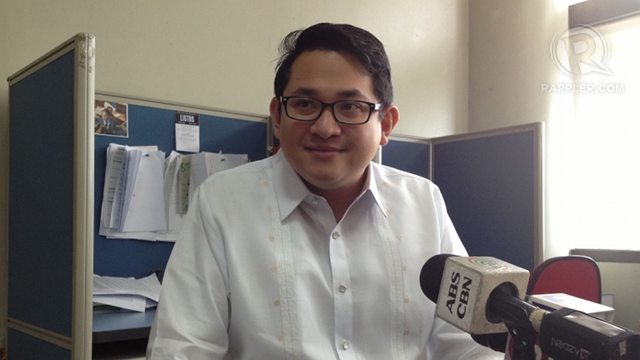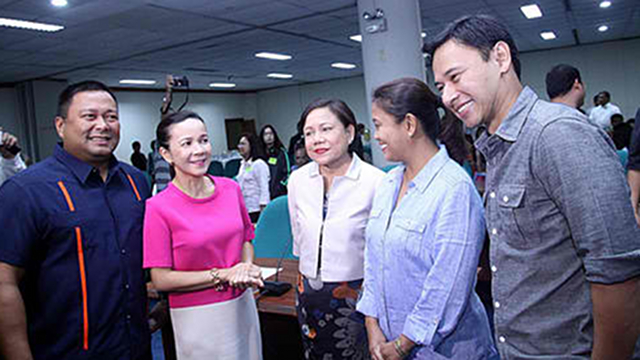SUMMARY
This is AI generated summarization, which may have errors. For context, always refer to the full article.

MANILA, Philippines – For the Senate’s youngest member, it is high time to reform the Sangguniang Kabataan (SK).
Neophyte senator Paolo Benigno “Bam” Aquino IV, 36, said he will file bills pushing for a “major overhaul” of the SK.
He made the statement as the Commission on Elections begins preparing for the SK polls in October. The SK is the youth legislature in every barangay.
“Yes, there have been recommendations to abolish that for a long time, but I am one of those preferring reforms over abolition. We should look at the cases of the SK in past years, see what areas led to minor success, what areas should be reformed,” Aquino told Senate reporters on Wednesday, July 3.
Aquino is the only neophyte senator who has not yet begun filing bills, saying he is still consulting stakeholders to ensure quality legislation. He said he wants his bills to reflect his advocacies on employment, business, and education.
The senator said he is looking at SK reform, including the flow of funds and how the SK is elected.
“What I don’t want to be removed is the representation in the local level because it is important. There are many suggestions that youth organizations replace the individual voices of the youth in the local levels. For me, we can reform all the aspects except taking out representation in the local level.”
Aquino used to chair the National Youth Commission (NYC), where the SK National Federation is represented. He was the second youngest senatorial candidate this year.
He identified the following flaws in the SK system:
- Lowering the age of the SK. “Originally, it was 15 to 21, but they lowered it to 15 to 17 years old. At that time, the most active in the SK were in the older range so when you chopped off the age, it’s like you took off one of the legs of the SK. Those 18 to 21 who are in college, who are more mature lost their chance to help out and participate.”
- Flow of funds. “We’ve heard a lot of problems that other youth programs do not push through because the older ones do not give them funds.”
- “Unclear relationship” between SK and NYC. “The president of the SK National Federation sits on the NYC as commissioner but they are not duty-bound to follow the policies of the NYC. The organizations are separate so it creates confusion.”
As part of the reforms, Aquino said the law of the NYC and related agencies will also have to be amended.
“I think this will be a major reform to give our youth a chance to participate in our governance structures.”
Besides SK reform, Aquino plans to file bills on youth entrepreneurship, and the development of small and medium enterprises (SMEs).
A social entrepreneur, Aquino said he wants greater capital for SMEs so economic growth will trickle down to the poor.
“I’m hoping we can ask the Department of Education to include entrepreneurial training and mindset as part of our curriculum so we can teach our children about savings and handling money.”
To push for his advocacies, Aquino is eyeing the Senate committees on trade and commerce, on social justice, and on youth, women and family. Senate President Franklin Drilon will finalize the committee chairmanships.

New senators to study water tax
The other 5 newbies also visited the Senate on Wednesday to attend a briefing on the offices and administrative procedures. Aquino was already briefed last week.
In interviews with reporters, the new senators said they will study Sen Ralph Recto’s resolution calling for an inquiry into reports that water concessionaires pass on income taxes to consumers.
Recto filed the resolution on Wednesday to investigate Maynilad Water Services Inc and the Manila Water Company. Recto cited the claim of consumer advocacy group Water for the People Network that the concessionaires pass on their income taxes, reaching P15.5 billion from 2008 to 2012.
Sen Nancy Binay said she supports Recto’s resolution.
“We should protect the interests of consumers. I am a consumer of utilities as well so we should investigate that and check the allegation. We are studying this together with my legal team to see if there is a basis for the allegation,” Binay said.
Sen Sonny Angara and Aquino said they want to study the resolution and the concession agreement first.
“If it’s an income tax of a company, they should pay that and it’s not something to be charged. I think both sides gave statements refuting things so we’ll look into that,” Aquino said.
‘Big brother didn’t help us’
The new senators also aired their views on the government’s plan to provide foreign allies with access to Philippine military bases amid the territorial dispute with China.
Angara said, “There may be constitutional or legal issues if it will be permanent. Whether it’s embodied in a treaty or an executive agreement, then the Senate will have to play a role. The details will determine the extent of our involvement.”
Sen JV Ejercito said there is nothing wrong with the plan for as long as the access will only be temporary.
Yet Ejercito said the United States must first live up to its commitment to “support” the Philippines in the territorial row with China.
“Nung nagkakaroon ng girian, ‘di naman talaga natin naramdaman ang suporta ng big brother and I think one of the provisions of the VFA is if one ally is in conflict with others, the other one will support.”
(At the height of the conflict, we didn’t really feel the support of big brother and I think one of the provisions of the Visiting Forces Agreement is if one ally is in conflict with the others, the other one will support.)
Under a mutual defense treaty signed in 1951, the Philippines and the United States are bound to help defend each other in case of external attacks.
Ejercito added, “We felt that they were not really there to back us up. So it’s like they just allowed China to bully us that time.” – Rappler.com
Add a comment
How does this make you feel?
There are no comments yet. Add your comment to start the conversation.